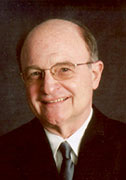larrydlauer.com
Excerpt [from Lauer bio]:

[Lauer] served seven years on the board of the Council for the Advancement and Support of Education (CASE), when it became truly international with offices in Washington, London, Singapore, and now Mexico. He considers his longtime international work in higher education and public broadcasting to be people-to-people communication, or “public diplomacy,” [JB emphasis] a topic he has been interested in since his graduate work at American University.From above blog citation:
- Foreign policy understanding requires government officials to speak from the same page. The larger the government, the more complicated this becomes.
- Diplomacy is defined as nation-to-nation communication and is conducted by departments of state through embassies.
- Public diplomacy [JB emphasis] is defined as people-to-people and government-to-people communication and is conducted by departments of state, nongovernmental organizations (NGOs), various associations, educational institutions, and citizen travelers.
- Digital technology and new media could enhance global understanding. But so far they have mostly magnified differences. Anger around the world seems to be increasing.
- Question One: Can the current rapid expansion of international education, cross-cultural people exchanges, and overall foreign travel, eventually produce a more peaceful world?
- Question Two: Is there a leader somewhere out there capable of bringing the heads of influential nations together under one common cause… freedom and justice?
- Question Three: Maybe the next American president?
No comments:
Post a Comment